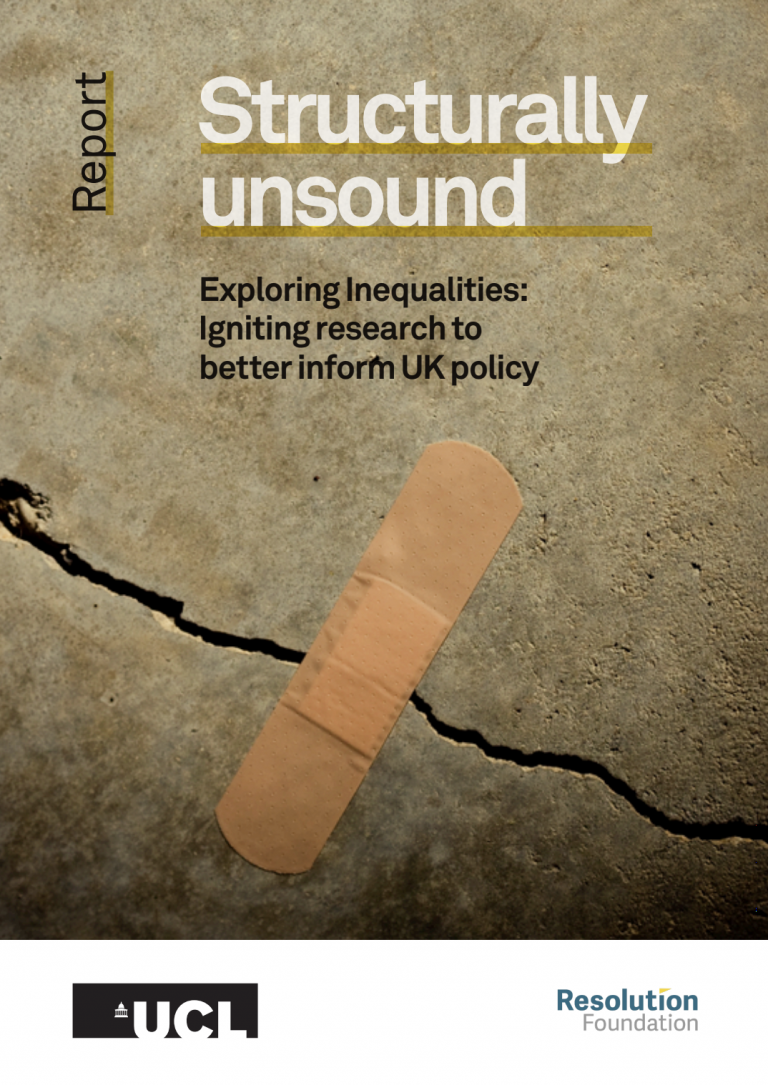Failure to fully understand structural inequalities holding us back
Posted on 17 Oct 2019 Categories: News, Reports

University College London and the Resolution Foundation have published a new report, Structurally Unsound, which explores the structural inequalities faced by different groups in the UK and seeks to drive forward research and policy design ‘in a way that truly grapples with the complex, nuanced and structural nature of the lived experience of inequalities’.
The report argues that
‘much of the political debate revolves around the “vertical” nature of inequality (whereby one individual, regardless of who they are, fares less well economically than their neighbour).’
It acknowledges that while this is ‘an important part of the story’, political debate often ignores the ‘horizontal’ forms of inequality, ‘inequalities that act at a group level – covering gender, race, disability, sexual orientation, trans status and class, for instance’. It states that these must be taken into account when addressing inequality; ‘it isn’t enough to focus on improving the rules of the game when the playing field itself is inherently uneven’.
The report recognises the legislative responses to these structural inequalities, from the Equal Pay Act of 1970 to the Religious Hatred Act of 2006, as ‘an essential part of the battle’, but not necessarily sufficient. Huge disparities remain: the proportion of BAME adults in work is 10.6 per cent behind the rate recorded for the white population, while the disability employment gap is around 30 per cent. Pay doesn’t look very different: ‘the average hourly pay of black male graduates is 24 per cent lower than that recorded among white male graduates’.
It highlights five themes that the authors believe ‘warrant consideration by all members of the research and policymaking communities that want to more effectively tackle structural inequality in the UK’: language, opportunity, understanding evidence, voice and place. Based on these, they set out a ‘list of lessons’.
The first is to ‘recognise that language matters’. This advocates a shared understanding of how language is used and an effort to root out the cultural biases contained within language that ‘act as a barrier to engagement with disadvantaged groups and prevent meaningful action’. Second, ‘shift the focus onto equity’, recognising that ‘structural inequalities emerge before birth and accumulate throughout an individual’s life’ and cannot be alleviated through access to opportunity alone. The report then highlights an issue in ‘quality and breadth of available evidence’, calling for a ‘diversity of evidence in decision making’ and an ‘an intersectional perspective to identify and plug gaps in understanding’. Regarding voice, it argues that in order to meaningfully change the structure of society, you have to change who designs it: measures to address social inequalities must be ‘implemented in conjunction with, not on, individuals experiencing disadvantage’. Finally, it advocates the need for a ‘place-based approach’ which recognises that inequalities are heavily linked to place and so ‘tackling issues at the right level is paramount’.
The report concludes:
‘By failing to fully understand the lived experience of inequalities and the interconnected, intrinsic nature of structural disadvantage we are tying one hand behind our back when it comes to designing policy aimed at alleviating inequity. To devise appropriate, sophisticated and nuanced policy solutions it is imperative that we take a more rounded view.’
Read the full report here.
